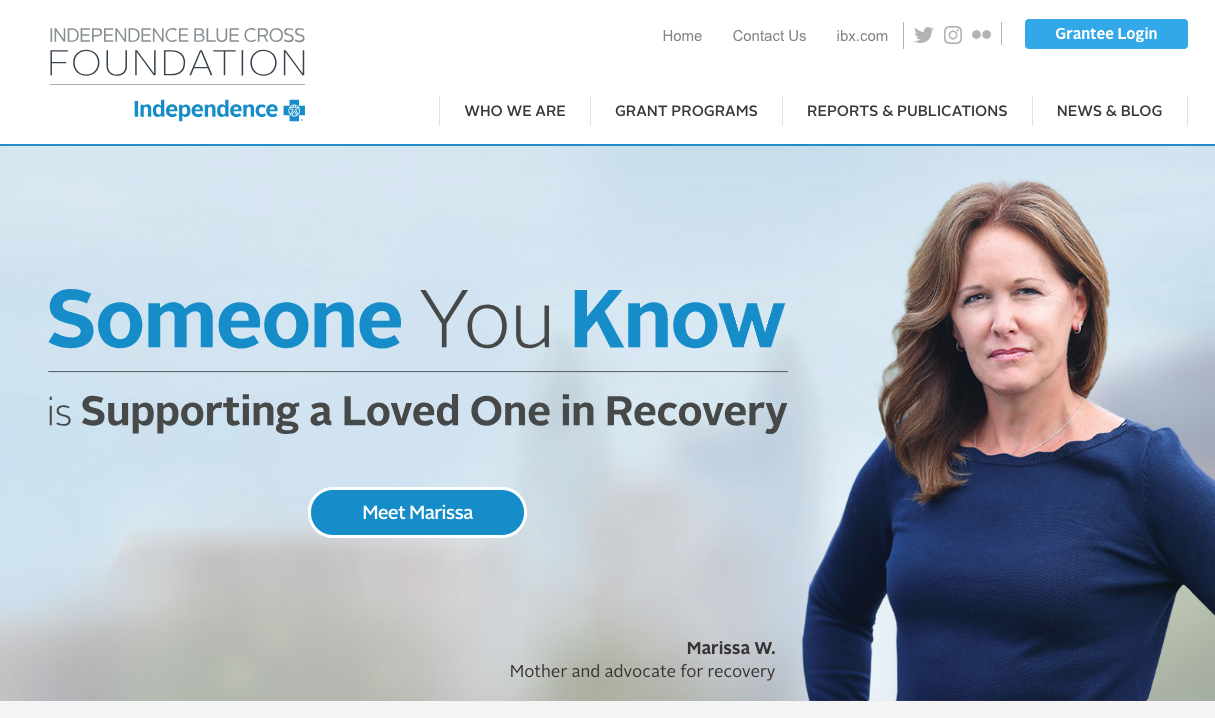How the Independence Blue Cross Foundation Approaches Health Grantmaking
/The Independence Blue Cross Foundation is one of many health insurance funders that we have been following here at IP, and this one is specific to the Southeastern Pennsylvania counties of Philadelphia, Bucks, Chester, Delaware and Montgomery. These types of funders are always good to know due to a highly local focus. Although this grantmaking foundation has been around since 2011, it recently launched two new initiatives.
One of them, The Healthy Hearts Initiative, aims to address cardiovascular disparities in underserved populations in Southeastern Pennsylvania, specifically related to survival rates associated with sudden cardiac arrest. The other one,the Supporting Treatment & Overdose Prevention (STOP) Initiative, addresses the opioid epidemic by increasing awareness and access to effective community-based opioid treatment and prevention.
To learn more about these initiatives and how nonprofits in Philadelphia can get the IBC Foundation’s support, we connected with the foundation’s president, Lorina Marshall-Blake, to ask a few questions.
Marshall-Blake had a lot to say about the biggest issues facing Philadelphia and the southeastern region of Pennsylvania today. Specifically, she believes that access to health care, especially in the region’s most underserved areas, is the most pressing issue in the region right now.
She elaborated to say:
Our five-county region represents a microcosm of the nation: We have an urban center, a suburban segment, and a rural segment. Access to healthcare varies significantly from community to community and can be affected by a variety of factors, including geographic, cultural and language barriers, as well as the cost of care. A 2015 report commissioned by the Philadelphia Department of Public Health found that the ratio of patients to primary care providers is about 900-to-1 citywide, but in certain neighborhoods, the ratio skyrockets to close to 3,000 adults for every primary care provider. That can translate into longer wait times for an appointment, which delays care. It can also result in seeking treatment in higher cost settings, such as hospital emergency rooms.
Given the many potential barriers that individuals face, health centers play a critical role in ensuring timely access to quality healthcare services. Amid the evolving healthcare landscape, health centers remain a source of care for significant numbers of uninsured and underinsured individuals.
That’s why the Independence Blue Cross Foundation supports health centers across the region through its Blue Safety Net program. Since 2011, we’ve awarded nearly $16 million in grants to a network of more than 40 nonprofits, private health centers across southeastern Pennsylvania that collectively serve nearly 200,000 residents, reaching 20 percent of the region’s uninsured population.
The foundation feels a responsibility to address national issues that are relevant to its local population – exactly the sort of thing we love to see from health insurance foundations. And unfortunately, the opioid epidemic and heart disease are two issues that affect pretty much everyone in the Philadelphia area – directly, indirectly, professionally and personally.
Marshall-Blake told us a bit about why the IBC Foundation chose to create the new initiatives about cardiovascular disparities and opioid abuse.
Since 2009, Philadelphia has seen a 43 percent increase in drug-related overdose deaths, according to a 2016 Drug Enforcement Agency (DEA) report. To help combat that alarming trend, we launched the Supporting Treatment and Overdose Prevention (STOP) Initiative to increase awareness and access to effective community-based opioid treatment and prevention. The initiative will expand outcome and evidence-based programs and community resources, identify the barriers to treatment and prevention, and disseminate effective community-based strategies and education around this public health epidemic.
Meanwhile, the problem of heart disease is particularly acute in Philadelphia. In 2015, more than 1,100 people died of sudden cardiac arrest (SCA). The likelihood of a victim surviving a cardiac arrest decreases by 10 percent each minute, highlighting the importance of bystanders trained to administer hands-only cardiopulmonary resuscitation (CPR). Hands-only CPR, pushing hard and fast in the center of the chest at a rate of 100 to 120 compressions per minute, has emerged as a recommended technique to saving the life of someone who experiences SCA. Unfortunately, however, the percentage of people in Philadelphia who received CPR from a bystander in 2015 was half the national average of 40.6 percent, according to the CPR Ready Campaign.
The Independence Blue Cross Foundation Healthy Hearts Initiative, which launched in November 2016, aims to address the cardiovascular disparities in communities across southeastern Pennsylvania by supporting primary and secondary prevention strategies, such as free hands-only CPR and automated external defibrillators (AED) education and training. Such programs are provided to the community by foundation-supported partners; the CPR Ready Campaign, Simon’s Fund and the Mobile CPR Project.
One question that we always like to ask grantmakers is what the theory of change is behind their funding. Marshall-Blake provided the following response to that question:
Whether we are working with neighborhood organizations to support healthier lifestyles, strengthen the delivery of healthcare, bolster the healthcare workforce, or convene nationally respected thought leaders to share ideas and strategies, the success of our foundation rests on the fortitude of our partnerships. From workshops to forums, we bring together experts from various fields to ideate, collaborate and help solve the region’s most pressing healthcare problems. We work together with all stakeholders to address the needs of our community. When everyone is working together toward the same goal, we can truly affect change.
Fortunately for grantseekers in the Philadelphia area, the IBC Foundation continuously seeks new grantees in the form of both organizations and initiatives working to improve access to healthcare, transform the way care is delivered, and build healthy communities. This is an accessible funder that’s willing to listen to its partners to better understand their needs, and one that sees a grant as much more than a check. Marshall-Blake told us that for the IBC Foundation, a grant represents a commitment to sustainability and that the crux of its work is relational.
“We see ourselves as more than a foundation, she said. “We are a thought-leader for the community, and we’re passionate about supporting initiatives that improve the health and well-being of the community.”
You can learn more about this funder in our full profile of the Independence Blue Cross Foundation and other locally focused foundations in our Philadelphia Funders Guide.




































